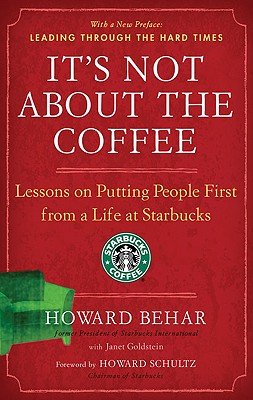星巴克這個很多消費者耳熟能詳的咖啡品牌創建於1971年。自1992年在那斯達克成功上市以來,星巴克的經營一飛沖天,其銷售額平均每年增長20 %以上,利潤平均增長率則達到30 %。經過十多年的發展,星巴克已從昔日西雅圖一條小小的“美人魚”進化到今天遍佈全球四十多個國家和地區,連鎖店達到一萬多家的“綠巨人”。星巴克的股價攀升了22倍,收益之高超過了通用電氣、百事可樂、可口可樂、微軟以及IBM等大型公司。今天,星巴克公司已成為北美地區一流的精製咖啡的零售商、烘烤商及一流品牌的擁有者,它的擴張速度讓《財富》、《福布斯》等世界頂級商業雜誌津津樂道。
霍華德.畢哈於1989年加入星巴克,擔任高級主管,這一年,星巴克只有28家分店。他歷任星巴克銷售部和營運部的執行副總裁、國際部總裁,以及星巴克北美區總裁。而現在,星巴克連鎖店達到了一萬多家。可以說,他為星巴克的發展做出了不可磨滅的貢獻。
「在星巴克,咖啡的品質必然是卓越的,從原豆的挑選和栽培、到咖啡的烘焙與濾煮。其願景必須是鼓舞人心而充滿意義的,而財務也必須是有條不紊的。然而缺少人,我們就一無所有。當一旦有了人,我們就多了些比咖啡更重要的事。」
在霍華德.畢哈身為星巴克資深主管的期間,他協助建立星巴克的咖啡文化,強調人重於利益。他培訓數以百計的各階層領導者,並協助該公司成為一家全球知名的品牌。如今他將透露引領他指導方針的十大原則──而且,其中沒有一項是和咖啡有關。
畢哈從以下這個觀念開始,就是假如你視員工和顧客為個人,那麼其他事情也可以水到渠成。假如你視員工為伙伴(而非勞動成本),他們就可以達到出乎意料的結果。還有假使你視顧客為貴賓(而非收益的來源),你就會和他們建立深刻情感連繫,而他們也會一再地光顧。
這些做法從創業之初就整合在星巴克的精神裡,並持續至今日。畢哈於書中分享這家公司歷史上轉捩點的故事,這個轉變有著無比的能量但卻不逃脫原始星巴克的文化。在書中他也討論到建立信賴、面對挑戰、敢於夢想,還有其他關鍵原則的重要性,例如:
瞭解你自己:只戴一頂帽子(Wear One Hat)
當組織清楚自己的價值、意圖及目標時,他們就能找到成就偉大之事的能量與熱情。
獨立思考:要做到知人善任、人盡其才(The Person Who Sweeps the Floor Should Choose the Broom)
我們必須擺脫成規──不論是真實或想像的──並鼓勵別人與自己獨立思考。
勇於承擔:只有事實聽起來才像事實(Only the Truth Sounds Like the truth)
沒有秘密,沒有輕慢的謊言,也沒有敷衍或推託。負起該負的責任,並帶著關懷與尊重,說出你必須說的話。
採取行動:像實幹家那樣思考,像思想家那樣行動(Think Like a Person of Action, and Act Like a Person of Thought)
找到熱情、意圖及堅持的最佳打點(sweet sopt)。「以人為主」不是一個想法,它更是一個行動。感覺、作為、思考;尋求平衡,更要付諸行動!
畢哈相信隨著工作越來越無階級之分,而全球經濟也將越來越傾向人際關係及溝通,人際領導原則的重要性就更勝往昔了。這本書也將位您一一呈現其中的奧秘。
本書特色
1.作者霍華德在星巴克只有28家店面、準備向全美和全世界擴張的1989年加入了公司,擔任高級執行官,後又擔任了星巴克銷售和運營的執行副總裁、星巴克國際公司總裁和星巴克北美公司總裁,于1996年加入了公司董事會。作者在本書中分享了星巴克歷史上每次轉折時期的內部故事。
2.作者作為高級執行官幫助公司確立了獨特的重視員工的文化,作者揭示了這一獨特的企業文化背後的領導藝術——與顧客和員工建立親密的情感紐帶,就像彌漫在空氣中的咖啡香氣,星巴克現在已“無所不在”,而它高速增長的背後原因,則是公司一直致力於的“人的事業”。這一領導藝術是很值得國內管理人士借鑒的。
3. 本書由星巴克的董事會主席霍華德.舒爾茨作序。
★本書中文版《星巴克:比咖啡更重要的事》由大智通出版
A Starbucks executive reveals how to promote business success, sharing stories about key turning points in Starbucks’ history to illustrate how the company came to embrace its philosophy about putting people ahead of profits.
“At Starbucks, the coffee has to be excellent, from the sourcing and growing to the roasting and brewing. The vision has to be inspiring and meaningful. Our finances have to be in order. But without people, we have nothing. With people, we have something even bigger than coffee.”
During his many years as a senior executive at Starbucks, Howard Behar helped establish the Starbucks culture, which stresses the importance of people over profits. He coached hundreds of leaders at every level and helped the company grow into a world-renowned brand. Now he reveals the ten principles that guided his leadership—and not one of them is about coffee.
Behar starts with the idea that if you regard employees and customers as human beings, everything else will take care of itself. If you think of your staff as people (not labor costs) they will achieve results beyond what is thought possible. And if you think of your customers as people you serve (not sources of revenue) you’ll make a deep connection with them, and they’ll come back over and over.
This approach has been integral to Starbucks from the start, and remains so today. Behar shares inside stories of turning points in the company’s history as it fought to hang on to this culture while growing exponentially. He discusses the importance of building trust, facing challenges, daring to dream, and other key principles, such as:
.Know Who You Are: Wear One Hat
When organizations are clear about their values, purpose, and goals, they find the energy and passion to do great things.
.Think Independently: The Person Who Sweeps the Floor Should Choose the Broom
We need to get rid ofrules—real and imagined—and encourage the independent thinking of others and ourselves.
.Be Accountable: Only the Truth Sounds Like the Truth
No secrets, no lies of omission, no hedging and dodging. Take responsibility and say what needs to be said, with care and respect.
.Take Action: Think Like a Person of Action and Act Like a Person of Thought
Find the sweet spot of passion, purpose, and persistence. “It’s all about the people” isn’t an idea, it’s an action. Feel, do, think. Find the balance, but act.
Behar believes that as work becomes less hierarchical and as the world economy becomes more and more about relationships and connecting, the principles of personal leadership are more important than ever. This book will show you the way.
作者簡介
霍華德.畢哈(Howard Behar)
前星巴克國際部總裁
在1989加入當時僅有28家分店的星巴克咖啡,擔任資深主管。他歷任星巴克銷售部營運部的執行副總裁、星巴克國際部總裁,以及星巴克北美洲總裁等,他也自1996年起成為該公司的董事會成員。目前與妻子琳恩住在西雅圖。
珍妮.葛史坦(Janet Goldstein)
曾與眾多企業家、公司領導,以及非營利組織共事的出版顧問。目前住在紐約。
Howard Behar joined Starbucks as a senior executive in 1989, when it had just twenty-eight stores. His positions have included executive vice president of sales and operations, president of Starbucks International, and president of Starbucks North America. He has also served on the company’s board of directors since 1996. He lives in Seattle with his wife, Lynn. Behar is donating his proceeds from this book to the CUP Fund (Caring Unites Partners) and the Robert Greenleaf Center for Servant Leadership.
Janet Goldstein is a publishing consultant who has worked with entrepreneurs, business leaders, and nonprofits.












